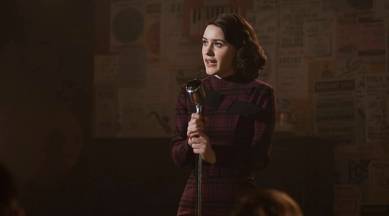Mrs Maisel’s Marvels
That her children seem to deliberately fade into the background is why the show works for some mothers. Mrs Maisel is Everywoman — angry and sad, inspired and hopeful, vulnerable and buoyant, at the same time.

Somewhere in the past few years, at least in India, women found self-love. Brené Brown became a role model, vulnerability became an asset, and ‘I am enough’ a badge to be worn. In the Instagram avalanche of personal stories, embracing our imperfections and owning our bodies became a trend.
But nothing truly prepared us for The Marvelous Mrs Maisel, currently in its second season on Amazon Prime. On the face of it, Mrs Maisel (aka Midge or Miriam) is a privileged Upper West Side (New York) woman with a marriage and two children, a manicured home and a talent for baking (she trades briskets to gain spots at a café for her husband’s unoriginal stand-up acts). When Midge’s husband decides to leave her for his secretary one night, her carefully curated life becomes a house of cards; she responds by venting in a drunken stupor in front of an audience at the same café and discovers something about herself: her flair for stand-up comedy.
Mrs Maisel is a lot. She’s endearing, witty, attractive, poised, well-dressed, the life of the party. She is the loud one, the funny one, the ballsy one, the weird one — and she lets all of them thrive. Midge has the goods to survive in a world of patriarchy, but there is no feminism in her universe, even though she occasionally stumbles into rallies and says things like, “Women will fix it. And accessorize it!”
Yes, she is a “fix it” bomb, much as my mother and I are; much as we all are.
She wears her sexuality lightly, her motherhood even lighter. When she talks about pregnancy — “allowing another human to grow inside you till it reaches 6-12 pounds and then giving it an escape route the size of a change purse” — you chuckle. When she wonders if she was meant to be a mother and maybe she picked the wrong profession, you lean forward. But Midge’s journey of finding her voice is far more layered than the predictable evolution from housewife to career woman.
As someone who struggled balancing motherhood with a writing career (and still does), I was reminded that even with all the strollers, baby-wearing gear, and tactile toys — birthing and caring for children inevitably presents a roadblock to nurturing of the self. Those “having it all” essay writers probably haven’t struggled with stifling creative freedom.
Midge is progressive in the way she turns her marital mishaps into material, without pointing fingers. I may not have her waist, or share her fetish for hats but I could see scenes from my life playing out as comedy (even the sad ones). Everything is material.
But I wasn’t perplexed that a show about a woman who is a mother does not focus on her motherhood. Her children are like byproducts — incidental, almost invisible, inaudible even. Yes, she has parents in the same building (and later, in the same house when she moves in with them); yes, she often leaves her children with them; yes, they were far less hands-on than she was; and yes, it was the maid who really looked after the children — I didn’t process the logistics. Except that time when, midway through wheeling her child in the park, she starts addressing a rally and I wondered where the baby was. I still loved her, and was in no mood to analyse her motherhood skills, which I would have done in my early years of motherhood, still hungover from prostaglandins. Perhaps she doesn’t overthink motherhood, although once, while on a tour, she calls home to speak to her mother, and wonders if “the baby” has forgotten her. She talks to mothers who rejoice when their children go to school as opposed to the perpetually joyful mothers. That her children seem to deliberately fade into the background is exactly why The Marvelous Mrs. Maisel worked for me. Maybe it shouldn’t have.
Money is never a problem for her in spite of a day-job as a sales-counter girl or cloak girl at a departmental store, having been demoted to working the phones. As a single mother with no child support, this should have jarred or made me angry — how unequal our lives were, despite having something in common. But it didn’t.
Mrs Maisel is Everywoman — angry and sad, inspired and hopeful, vulnerable and buoyant, at the same time. The show isn’t applauding Midge’s bravado for the choices she makes. It works because it treats her motherhood and stand-up career as mutually exclusive events. I can’t believe that a show set in the 1950s is so relatable: perhaps the universally internalised notion of a joyful motherhood is at loggerheads with the desire to pursue joys of a different sort. We can’t pretend that deriving joy from our children doesn’t come at the expense of our own professional/ creative journeys. Amid all the cacophony of voices we nurture, sometimes, we can still hear our own. And that’s just fine.